The landslide victory of the BJP in General Election 2014 has torpedoed the top-ranked DU’s four-year undergraduate programme introduced last June, with all its 64 affiliated colleges compelled to revert to traditional three-year courses
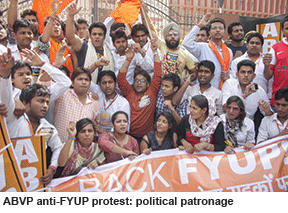 THE ABSOLUTE LOK SABHA majority won by the Bharatiya Janata Party (BJP) this summer has torpedoed Delhi University’s path-breaking four-year undergraduate programme (FYUP) which became operational last June in all 64 affiliated colleges including the highly-fancied St. Stephen’s, The Sri Ram College of Commerce, and Miranda House. With the BJP having ill-advisedly promised to scrap FYUP in its populist election manifesto, the Central government-funded University Grants Commission (UGC), the country’s apex higher education regulatory body which had given the green signal to the FYUP last year, made a not-so-mysterious U-turn and directed DU to abrogate the four-year undergrad programme and admit students into the original three-year programme for the academic year 2014-15 starting next month (August).
THE ABSOLUTE LOK SABHA majority won by the Bharatiya Janata Party (BJP) this summer has torpedoed Delhi University’s path-breaking four-year undergraduate programme (FYUP) which became operational last June in all 64 affiliated colleges including the highly-fancied St. Stephen’s, The Sri Ram College of Commerce, and Miranda House. With the BJP having ill-advisedly promised to scrap FYUP in its populist election manifesto, the Central government-funded University Grants Commission (UGC), the country’s apex higher education regulatory body which had given the green signal to the FYUP last year, made a not-so-mysterious U-turn and directed DU to abrogate the four-year undergrad programme and admit students into the original three-year programme for the academic year 2014-15 starting next month (August).
On June 20 UGC, which under the University Grants Commission Act, 1956 grants the all-important ‘recognition’ and funds all 42 heavily subsidised Central universities, while bestowing ad hoc small change upon a chosen few of the country’s 700 universities and whose study programmes also need its approval, issued a stern warning to DU and affiliated colleges. “Colleges shall admit students at the UG (undergraduate) level for academic year 2014-2015 only to the three-year UG programme which was offered by it prior to the introduction of the four-year system and report compliance to the UGC soon after. Any deviation or contravention of this order shall be viewed seriously and may attract action including withdrawal of grant facilities,” said the order signed by Vikram Shah, director (administration) of UGC. Faced with this ultimatum, on June 27 DU rolled back its FYUP, and issued a directive to its affiliated colleges to admit students for 2014-15 “under the scheme of courses that were in the academic session 2012-13”.
Behind UGC’s unembarrassed volte face, DU academics discern the not-so-hidden hand of the BJP leadership, in particular of the surprise new Union human resource development minister Smriti Irani, a former television star and frontline party spokesperson on television chat shows during BJP’s election campaign. Immediately after she was sworn-in, a steady stream of teacher and student delegations has been meeting with Irani, pressing for the rollback of Delhi University’s FYUP. On June 7, a delegation of the Akhil Bharatiya Vidyarthi Parishad (ABVP), the student wing of the BJP, presented a memorandum demanding withdrawal of FYUP. Earlier on May 30, a delegation of DU teachers and students had presented a similar petition to the new HRD minister, even as the sprawling DU campus transformed into a war zone with pro and anti-FYUP students and teachers’ organisations voicing daily protests.
The back and forth on Delhi University’s FYUP has hit national headlines and consumed hours of footage on all television news channels because DU (estb. 1922) is not just another Indian university. In all media surveys and varsity league tables, DU is routinely ranked the country’s #1 university with its top-ranked colleges, whose tuition fees are heavily subsidised by (relatively) lavish UGC grants, the academic mecca for the great majority of middle class school leavers. However — and perhaps inevitably — in the annual World University Rankings 2013 published by the London-based Quacquarelli Symonds (QS), DU is ranked a lowly 441-500, way below not only British, American and Commonwealth varsities but below dozens of Asian (and Chinese) varsities.
With chambers of commerce, captains of industry, HRD managers among others regularly expressing despondency over unemployable graduates — a Nasscom-McKinsey World Institute Study (2005) famously commented that 75 percent of engineering and 85 percent of arts, science and commerce graduates of Indian universities are unqualified for employment in multinational companies — the FYUP was vice chancellor Dinesh Singh’s somewhat panicky attempt to broadbase undergraduate education in DU and improve the job-profile of the varsity’s graduates. Although Singh was able to persuade the Congress-led UPA government to adopt a hands-off policy towards the FYUP, the landslide win of the BJP — which had committed itself to abolition of the programme in its election manifesto — threw a spanner in the works.
Confronted by a rising tide of anti-FYUP agitation re-energised by new-found political patronage, Singh raised the banner of university autonomy. According to him, under the Delhi University Act, 1922 the university is empowered to start new courses or programmes with the approval of its academic council, executive council and university court, all of whom approved introduction of FYUP in December 2012, making it the first publicly-funded university in India to switch to a four-year undergraduate programme. Subsequently the FYUP was introduced by all 64 affiliated colleges of the university at the start of the academic year 2013-14.
According to Singh, a survey conducted among students who have completed the first year of FYUP indicates that almost 80 percent of them are “happy” with the programme. “The survey was anonymously conducted in all the colleges of the university and students have embraced the structure very well. One thing (sic) that the FYUP has done is that it has created more opportunities for students and they acknowledge that,” Singh told The Pioneer (June 2).
Fully supported by former Union HRD minister Kapil Sibal, Singh, a mathematics professor who was appointed vice chancellor of India’s most respected university in October 2010, and his reportedly “rubber stamp” executive and academic councils, designed the new syllabus in a record time of six months and introduced it in DU affiliated colleges in August 2013.
"THE OLD THREE-YEAR system didn’t provide any flexibility to students to change their courses or choice of subjects mid-way. In the earlier model, students opted for their undergraduate degree subjects based on their specialisation in class XII, marks and hearsay. This rigid model dissuaded students to explore their academic interests in other courses as their programme structure didn’t allow enough scope of multi-disciplinary studies. However, the four-year system allows a student the flexibility to study subjects they like and also offers them a chance to choose their subjects while still pursuing their degree (without wasting a year),” said Singh in an interview to the Indian Express (May 14, 2013). Despite being India’s most widely read education news magazine, EducationWorld was not as privileged as this daily and several calls and e-mails to Singh for explanations/interviews remain unanswered.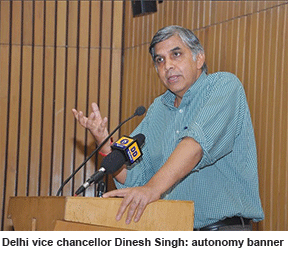
Undoubtedly, in sharp contrast to the traditional three-year BA/B.Sc/B.Com programmes which have endured to little effect for over six decades, the FYUP enabled students to study a mix of arts, science, and commerce subjects. The FYUP mandates that in the first two years all students shall compulsorily complete 11 foundation (core) courses including communication and life skills, language, arts, commerce, science and life, business, entrepreneurship and management, maths, culture and civilization and governance and citizenship. Simultaneously in the first year a student chooses her major known as Discipline 1 and in the second year a minor (Discipline 2). But unprecedentedly, irrespective of her stream (arts, science or commerce) in class XII, a student could choose a major from any discipline, and minor from across disciplines. For instance a student who chooses any science subject as her major, was free to choose political science or history as her minor. Similarly an English literature major could choose to study physics, chemistry or even mathematics as her minor (see box p.68).
Refreshingly, the now revoked FYUP also offered several exit options to students. After completing two years of the programme a student could exit with a diploma. If she chooses to press on for three years, a Bachelor’s degree. If she completed FYUP she would have been awarded a BA, B.Sc or B.Com (Hons) degree. Moreover in an unprecedented innovation, students who exited with diploma or bachelor’s degrees were given a time window of eight years within which they could sign up with any DU college to write the bachelor’s or honours exams.
Ex facie, FYUP with its broad-span multi-disciplinary subjects mix, three certification options and right to resume studies, is a well-thought and intelligently conceived academic programme. Indeed it’s difficult to disagree with DU’s www.fyup.du.ac.in website which says: “The emphasis is to tone down the classical mode of overburdening theory-based dissemination of knowledge within the confines of a lecture hall and thus redefine education. The out-of-the box new curriculum ensures simple concepts-based learning with emphasis on examples from the real world, interactive analysis, group discussions, hands-on-training, visit to appropriate sites for a grasp of the realistic demands and project handling.”
Madan Mohan Chaturvedi, director of the Cluster Innovation Centre of Delhi University and a member of the Academic Council which endorsed FYUP, believes that it offers “a complete overhaul of the undergraduate education system and processes”. “If we are to realise the full potential of the demographic dividend in the coming decades of the 21st century, it is important to offer up-to-date contemporary education. Pedagogy needs to change, technology needs to be brought into classrooms and the curriculum and learning spaces in colleges need to be made student centric. The FYUP has set a new paradigm for undergrad education in the country,” says Chaturvedi.
UNDENIABLE DU’s FYUP even if hastily and imperfectly designed as alleged, is a conceptually innovative undergrad programme which could have benefited India’s moribund and rapidly obsolescing higher education system which has failed to keep pace with the rest of the world. The overwhelming majority of India’s 700 universities and 35,000 colleges offer restricted and outmoded curriculums, rote-centric pedagogies, time-serving faculty and pathetic infrastructure. The three-year undergrad programme which culminates in the award of generic BA/B.Sc/B.Com degrees has remained immune to innovation and is a relic of the British raj, certifying ill-equipped graduates unready to meet the modest expectations of industry and academia in the fast-globalising marketplace.
According to Aspiring Minds, a Gurgaon-based recruitment company which assessed the employability of over 60,000 bachelor’s degree holders countrywide, and published an Employability Report on Indian Graduates (2013), 47 percent of arts, science and commerce graduates certified by Indian universities are unemployable. “For an analyst’s role, close to 84 percent graduates were found to lack the right levels of cognitive ability. 90 percent graduates did not have required proficiency in English communication. The employability of graduates varies from 2.59 percent in functional roles such as accounting, to 15.88 percent in sales related roles and 21.37 percent for roles in the business process outsourcing sector. A significant proportion of graduates, nearly 47 percent, were found not employable in any sector, given their insufficient English language and cognitive skills,” says the report in a damning indictment of collegiate education in India.
Dinesh Singh confirms that public criticism and unacceptability of DU graduates — despite DU being India’s #1 ranked university in all national league tables — was a prime factor behind his decision to introduce FYUP. “I have met representatives of some of the best corporate institutions that came to visit the university. Even for very basic jobs, they did not find a single student who met their standards. The present system gives students nothing needed for a job,” Singh told Indian Express (April 15, 2013).
MOST DU ACADEMICS and faculty concede that the inherited three-year degree programme of the varsity needs to be overhauled. Their beef is that the FYUP was expanded and designed in unseemly haste, and pushed through by Singh who bulldozed the varsity’s academic and executive councils. “Our case is that quality restructuring cannot be achieved in such a short span of time and that DU is not prepared in terms of infrastructure, faculty, libraries, etc to implement FYUP. Therefore it should be deferred and thoroughly debated before implementation. Such a radical change has national consequences and must be debated at the national level. Instead it has been discussed by secret committees without peer review,” says Abha Dev Habib, physics lecturer at Miranda House and member of the Delhi University Teachers’ Association (DUTA).
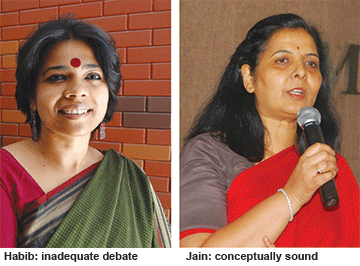 The strident protests of DUTA dominated by India’s infamous and argumentative jholawalas (left-wing academics) who draw handsome (by Indian standards) remuneration ranging from Rs.37,800-96,240 per month for dispensing substandard education without any accountability for graduate placements, has aroused some scepticism. “Left led campaign against DU VC, coz he challenged their monopoly in appointments + defining courses. New curriculum makes teachers accountable,” tweeted well-known feminist and writer Madhu Kishwar on June 22.
The strident protests of DUTA dominated by India’s infamous and argumentative jholawalas (left-wing academics) who draw handsome (by Indian standards) remuneration ranging from Rs.37,800-96,240 per month for dispensing substandard education without any accountability for graduate placements, has aroused some scepticism. “Left led campaign against DU VC, coz he challenged their monopoly in appointments + defining courses. New curriculum makes teachers accountable,” tweeted well-known feminist and writer Madhu Kishwar on June 22.
However it’s noteworthy that the anti-FYUP movement in Delhi has been supported by some of the country’s top academics with impeccable credentials. Among them Dr. Krishna Kumar, professor of education at DU and former chairman of NCERT; Jayati Ghosh, economics professor at JNU; and renowned historian Dr. Romilla Thapar. But rather than the FYUP concept they have criticised the arbitrary, slapdash and hurried manner in which it was implemented last year.
Among such critics is Dr. Pratibha Jain, founder-director of Edu Abroad, a Mumbai-based higher education consultancy. “A four-year undergraduate degree based on a broad spectrum of disciplines is a step forward towards meeting global standards. It will equip students with the skill-sets to meet industry demand for multitasking employees. Moreover, from a socio-economic perspective, an extra year in college pushes up the age of marriage and the workforce. But a great concept floundered because DU thrust FYUP upon students and teachers without adequate consensus building and preparation. Sufficient attention was not given to curriculum development or even identifying textbooks. Hasty implementation of a conceptually sound programme unsupported by application material and faculty training, has destroyed a potentially promising and overdue initiative,” laments Jain.
Student opposition to FYUP was spearheaded by DUSU (Delhi University Students Union) and the Akhil Bharatiya Vidyarthi Parishad (ABVP), the students’ wing of the ruling BJP. For over a year since FYUP was introduced last year, these students’ organisations have been demanding its rollback. They allege that FYUP will “Americanise Indian higher education” and impose the expense of an additional year upon students.
“The FYUP requires an additional year of study which will add to the financial burden of every student. In a country where millions of youth can’t afford higher education, the additional burden of tuition fees and residential accommodation will push the dream of studying in DU further away. In particular how will students from socio-economically weaker backgrounds bear the expense of the extra year? Instead of promoting new colleges and expanding existing capacity, Delhi University is becoming more exclusive, limiting the number of students,” argues Saket Bahuguna, Delhi state secretary of ABVP.
CLEARLY, THIS argument in favour of the status quo overlooks the reality that the price of acquiring a sub-optimal degree is likely to be much higher — in terms of long internships, low start-up pay and slow promotions as DU graduates learn on the job — instead of hitting the ground running and quickly transforming into performing executives, professionals or academics. Moreover it’s well-known that the heavily subsidised fees demanded by DU and its affiliated colleges are among the lowest worldwide — Rs.8,000 (Miranda House, Hindu College) to Rs.22,435 (St. Stephen’s, Lady Shri Ram) per year. Instead of opposing FYUP which will give them better returns and incomes in adult life beyond college gates, students would be well-advised to agitate for cheap student loans and targeted subsidies for genuinely needy students.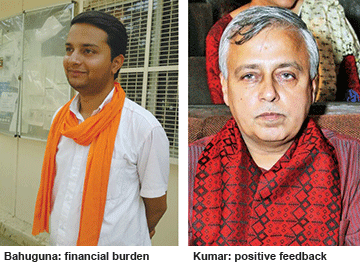
But even as DUTA, DUSU and ABVP campaigns have succeeded in pressurising DU to scrap FYUP, some DU-affiliated colleges report positive feedback about the first year of implementation. “While students and teachers were initially apprehensive about pedagogy, course content, and increased focus on project and field work, things seem to be falling in place. By the end of the third semester we expect things to settle further. FYUP has delivered its promise of offering inter-disciplinary curriculums with students studying 11 foundation courses, which include science, commerce, humanities and languages. Students appreciate the flexibility and wider subject choice available in FYUP,” Pradumn Kumar, officiating principal of Hindu College, one of DU’s star colleges, told EducationWorld prior to the rollback.
Under the now defunct FYUP structure, DU’s conversion of a batch of six B.Sc degree programmes — computer science, electronics, instrumentation, psychological science, food technology and polymer science — into a four-year B.Tech, had received encouraging student response and increased enrolment.
Dr. Geeta Bhatt, associate professor, department of instrumentation at the DU-affiliated Bhaskaracharya College of Applied Sciences, describes this transition as a “watershed moment”. “Last year we got high quality students for the new B.Tech course.
A lot of value has been added to each subject and the content has become more application based in the modified four-year B.Tech degree programme. Interactive classes, project work and research, prompted self-study which would have helped students develop problem solving and critical thinking skills,” says Bhatt.
Although DU’s belated introduction and subsequent pullback of its FYUP aroused great passions and was the first-of-its-kind in any Central government university, it’s important to note that four-year multi-disciplinary undergrad study programmes are not unknown in India. Ambedkar University, established in 2007 by the Delhi state government through special legislation, the privately promoted Foundation for Liberal and Management Education (FLAME) Academy, Pune (estb. 2007), Shiv Nadar University, Greater Noida (estb. 2011) and O.P. Jindal University, Sonepat (estb. 2009) introduced four-year undergraduate programmes ab initio.
Moreover the newly promoted Ashoka University, Sonepat which is all set to admit its first batch of students next month, also offers a four-year liberal arts undergraduate programme. Likewise the state-funded Bangalore University will launch a four-year BS (bachelor of science) programme this year. The consensus of opinion among latter-day educationists beyond the highly-politicised DU campus, is that US-style four-year broad-based undergrad programmes are necessary to produce students prepared to meet the complex challenges of 21st century workplaces.
"FOUR-YEAR PROGRAMMES allow students the opportunity and flexibility to achieve multiple objectives during undergraduate education. Students can specialise in a subject of their choice, while choosing electives which enable them to explore other subjects of interest. During this expanded time-frame they can build a broad-based foundation of essential knowledge, and develop life and co-curricular skills to enable them to succeed in their future careers. It’s difficult to do all of this in a three-year programme, especially when students are required to focus on a single discipline,” says Dr. Nikhil Sinha, vice chancellor of Shiv Nadar University.
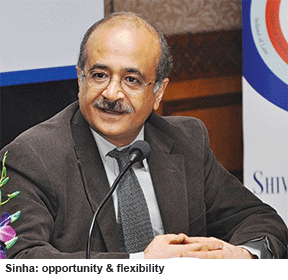 The four-year undergrad programme is a US academic innovation — the UK, Australia and all Commonwealth countries dispense three-year undergrad programmes. Obviously parents and students world over discern the logic and advantages of a multi-disciplinary undergrad education, because America’s higher education system hosts 1 million foreign students including 94,563 Indians, a number far greater than all other countries put together.
The four-year undergrad programme is a US academic innovation — the UK, Australia and all Commonwealth countries dispense three-year undergrad programmes. Obviously parents and students world over discern the logic and advantages of a multi-disciplinary undergrad education, because America’s higher education system hosts 1 million foreign students including 94,563 Indians, a number far greater than all other countries put together.
In the circumstances, the decision of Delhi University’s executive and executive councils to introduce the FYUP was undoubtedly a step forward and upward. But there’s also considerable merit in the charge levelled by respectable academics committed to raising higher education standards, that the FYUP programme was implemented in a slapdash and rushed manner without adequate brainstorming, thought and time given to the design of new courses, or addressing the problem of a massive (4,000) faculty shortage in DU and its affiliated colleges. Even now it’s not too late for all stakeholders — UGC, DU management, teachers and students — to discuss and deliberate corrective measures to strengthen FYUP course content and pedagogies.
“Transitory processes are often painful but they tend to settle down over a period of time. Great institutions have all gone through such phases. It would be premature to conclude that a great institution like DU can be ruined by one or other such phase. The system’s resilience is in its structure, of which teachers and students form the core,” wrote Chandrachur Singh, assistant professor of political science at Hindu College, at the time when DU’s FYUP was being designed (The Hindu, May 4, 2013),.gif)
But unfortunately with the change of government at the Centre, DU’s FYUP has met a messy end with over 60,000 students, who have completed the first year, in a limbo about their future study programme. Moreover the intervention of UGC, patently prompted by the new BJP-led NDA administration at the Centre, has further muddied waters while giving a huge setback to the subterranean movement towards greater autonomy for the country’s 700 universities. An enterprise of great pith and moment has been upturned by rash introduction and perhaps poor execution.
Clearly the new HRD minister Smriti Irani’s resolve to revive Indian education has got off to a bad start, with the Central government-funded UGC invoking the spirit of licence-permit-quota-raj to cabin, crib and confine India’s most respected university. As we go to press, DU has heeded the UGC’s demand to admit students in the erstwhile three-year undergrad programme, spelling finish to its FYUP, trumpeted as a “harbinger of hope for higher education in the country”.
With India’s premier university opting for safe mediocrity over a great leap forward, the voyage of its graduates will continue to be bound in shallows and misery.
With Garima Upadhyay (Delhi) & Nadia Lewis (Mumbai)